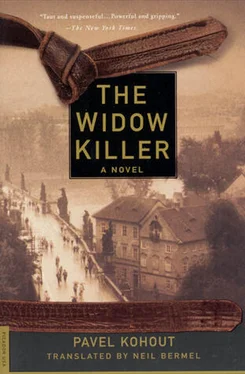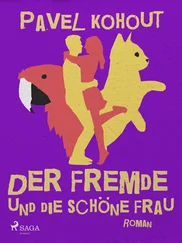How would he get back here? he wondered once she had disappeared into the house. And would he come back at all? The only thing he knew for sure was that he loved and admired her.
He and Litera retraced their journey. At the railway bridge two pot-bellied garbage trucks had joined the buses. Men in leather aprons were rolling heavy trash cans over from the nearby houses, but instead of feeding their contents to the metal stomachs, they made rows of them in front of the trucks. Litera stuck his head out the window.
“What’s it going to be when it’s finished?”
“City radio just urged people to set up barricades. The Germans are on their way from Bene  ov!”
ov!”
Buback felt sure it was a consequence of his information — the first result of his betrayal… no! He remembered Grete’s words: he had simply tried to mitigate the effects of a grand treason his people had perpetrated on… on his people, yes…. what was he anyway? A Czech, like his mother, or a German, like his father? Wasn’t he a living example of the senselessness of nationalism? And therefore wasn’t he predestined by his heritage to….
A traffic policeman jumped out of the left bus and cut off his musings.
“You won’t get through along the embankment: the Nazis are there and now they’re shooting.”
Litera squinted at his neighbor. Buback said in reply, “We’ve done well so far together. I’ll cross the last German watchpoint with you, and once I’ve negotiated your way out, I’ll go back to Bredovská Street on foot.”
He saw the driver blink in shock.
“Tell Mr. Beran that I’m trying to talk to my supervisor, who was just promoted; I’m hoping he’ll agree to proclaim Prague an open city they won’t fight for. I’ll try to get back with fresh news as soon as possible; could you ask the chief to inform your guard posts?” “You’re asking for trouble, Mr. Buback, do you know that?” “Well, did you know I was born here, in Prague?” They passed easily through several checkpoints on Czech-controlled territory, getting as far as  tepanska Street, where the German-occupied city center began. From there on no one stopped them; the presence of an employee from the Gestapo building must have been relayed by field telephone. Buback rode with him as far as the boundary formed by a row of machine guns; now Litera would easily be able to draw a plan of the German defenses. Am I a spy on top of everything else? Buback wondered.
tepanska Street, where the German-occupied city center began. From there on no one stopped them; the presence of an employee from the Gestapo building must have been relayed by field telephone. Buback rode with him as far as the boundary formed by a row of machine guns; now Litera would easily be able to draw a plan of the German defenses. Am I a spy on top of everything else? Buback wondered.
When they parted and the car disappeared in the direction of Národni Avenue, he set off back toward Bredovská to the sound of detonations carried down from the radio on the spring wind. What chance, he wondered, did a small cog like he have of influencing the workings of this huge machine?
Jan Morava’s first direct military involvement in the Second World War lasted all of a few long seconds. By the time he had reached the bend in the staircase in a hail of fire that miraculously missed him, the fifteen policemen ahead of him had used the element of surprise to clear the Germans from the main halls of the second and third floors. The occupiers were now stuck in the side hallways, preventing the Czechs from breaking through to the broadcast studios, wherever they were. The newcomers moved to secure what they held to the left, the right, upstairs, and downstairs. SS troops still held the fourth floor, which was the seat of the German directorate; at noon they had driven the first group of Czech policemen up to the top floors, where they were still contained.
In both mezzanines and the mouths of the corridors, barricades of desks and file cabinets were going up all around Morava, while he racked his brain. How could he achieve the main task Beran had set him: ending the fighting?
The modern 1930s building was like a labyrinth; its hundreds of locked doors, all missing their plaques, would have been a tricky puzzle under normal circumstances, let alone with ricocheting bullets whizzing past like crazed bees. He knew the Germans must still be searching for the source of the broadcasts, which were being heard across Bohemia. If they found them, brave announcers and technicians would die, and Germany would inflict a heavy moral defeat on a citizenry trying to atone for the national shame of the 1938 Munich capitulation. Morava understood: The fighting had to be stopped or resolved as soon as possible. With Sucharda dead, the young detective was now in charge.
Fortunately the city telephones were still working and the radio’s switchboard had not been disconnected. The employees trapped there led him on all fours to a phone; a sniper was peppering the front of the building from an attic window opposite. They drew him a rough plan on the wooden tiles of the whole complex and a more precise map of the back wing where the broadcasts were coming from.
At Bartolom  jská they either could not or would not bring Beran or Brunát to the telephone. Finally they got Superintendent Hlavatý, who had so brilliantly scented the widow killer’s trail in the Klasterec priest’s missive. He instantly grasped the urgency of the problem, and shortly thereafter Brunát’s voice came on the line. On the advice of two editors, former reserve officers, Morava requested that he send another armed unit through the attics of neighboring houses and across the flat roofs. With this assistance, the men defending the upper floors and those down below could clear the Germans from the middle and then the base of the building.
jská they either could not or would not bring Beran or Brunát to the telephone. Finally they got Superintendent Hlavatý, who had so brilliantly scented the widow killer’s trail in the Klasterec priest’s missive. He instantly grasped the urgency of the problem, and shortly thereafter Brunát’s voice came on the line. On the advice of two editors, former reserve officers, Morava requested that he send another armed unit through the attics of neighboring houses and across the flat roofs. With this assistance, the men defending the upper floors and those down below could clear the Germans from the middle and then the base of the building.
The Germans in the middle had fortunately run out of grenades and lacked Panzerfausts; like the Czechs beneath them, they were cut off from supplies on the ground floor. The first side to obtain reinforcements would break the stalemate.
“I’ll bring them personally,” Brunát promised. “The radio’s the key to everything now. But try to negotiate with the Germans; maybe they’ll fold of their own accord.”
“Depends whether Schörner’s set out already,” Morava replied. “How does it look?”
“For now it seems we’re ahead by a hair. The city radio’s sending out instructions on how to build barricades. Prague’s starting to become impassable; I’m afraid it’ll take us a while to get to you.”
“Try the way we went: up Wenceslas Square past the Germans— yes, they’re reserve officers and new recruits. If you wear police uniforms and formulate your request correctly, it gives them the option of saving their own skins without losing face.”
“Wait, Jan….” He heard Brunát give a muffled assent. “Beran says that in the name of the Czech National Council you’re to meet with Thürmer, the German radio director. You can offer free passage for German employees and soldiers, but careful: no weapons, period. Break a leg; we’ll be over in a jiffy to give them a good-bye kiss.”
They crawled out of the threatened office to plot how and when to proceed, shouting at each other in the hallway against the noise of the battle. Morava picked the two who spoke the best German and were least afraid to negotiate with Thürmer. The apparently insurmountable problem of how to contact him was solved again by the telephone.
“The director will meet with you,” his secretary responded after a short while, “if you’ll stop shooting and cease your hostile broadcasts from this building for the duration of the negotiations.”
Morava rejected the second condition. Thirty employees trapped unexpectedly by the turn of events were squashed with the policemen into a narrow space between the unreliable-looking wooden barriers. In a few cases, their nerves were in tatters.
Читать дальше

 ov!”
ov!” tepanska Street, where the German-occupied city center began. From there on no one stopped them; the presence of an employee from the Gestapo building must have been relayed by field telephone. Buback rode with him as far as the boundary formed by a row of machine guns; now Litera would easily be able to draw a plan of the German defenses. Am I a spy on top of everything else? Buback wondered.
tepanska Street, where the German-occupied city center began. From there on no one stopped them; the presence of an employee from the Gestapo building must have been relayed by field telephone. Buback rode with him as far as the boundary formed by a row of machine guns; now Litera would easily be able to draw a plan of the German defenses. Am I a spy on top of everything else? Buback wondered. jská they either could not or would not bring Beran or Brunát to the telephone. Finally they got Superintendent Hlavatý, who had so brilliantly scented the widow killer’s trail in the Klasterec priest’s missive. He instantly grasped the urgency of the problem, and shortly thereafter Brunát’s voice came on the line. On the advice of two editors, former reserve officers, Morava requested that he send another armed unit through the attics of neighboring houses and across the flat roofs. With this assistance, the men defending the upper floors and those down below could clear the Germans from the middle and then the base of the building.
jská they either could not or would not bring Beran or Brunát to the telephone. Finally they got Superintendent Hlavatý, who had so brilliantly scented the widow killer’s trail in the Klasterec priest’s missive. He instantly grasped the urgency of the problem, and shortly thereafter Brunát’s voice came on the line. On the advice of two editors, former reserve officers, Morava requested that he send another armed unit through the attics of neighboring houses and across the flat roofs. With this assistance, the men defending the upper floors and those down below could clear the Germans from the middle and then the base of the building.










